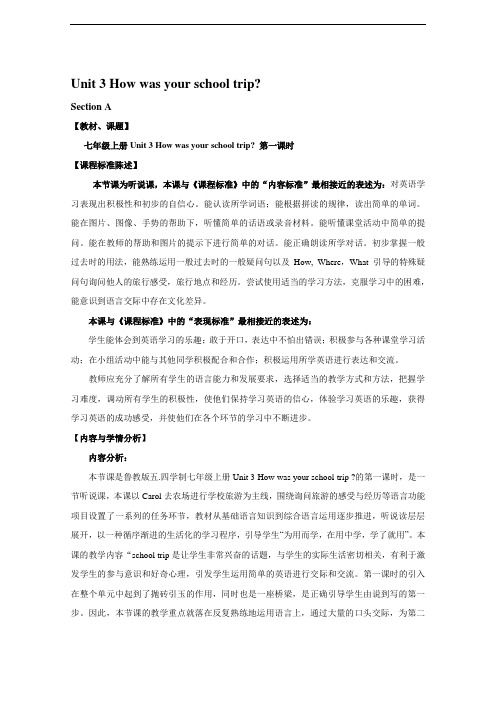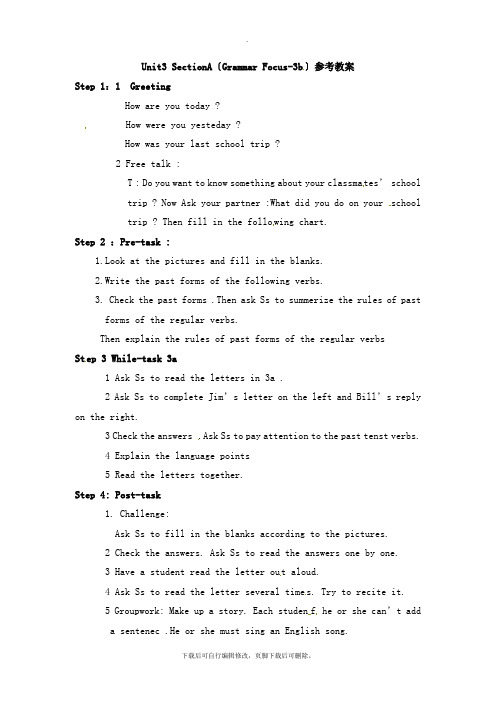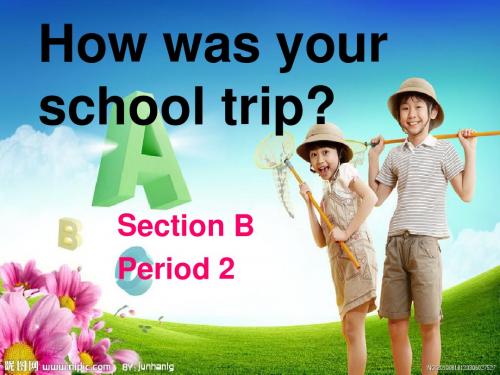Unit 3 How was your school trip Section B 2b
鲁教版七年级上册Unit3 A(2d-3b)

Past过去
Present现在
rode a horse
ride a horse
fed chickens
feed chickens
took some photos take some photos
went for a walk go for a walk
talked with a farmer talk with a farmer
needed /'ni:dId/
清念 /t/, 元浊/d/;
/t/ /d/ 之后念/ Id/
不规则动词的过去式
go come get ride do is are have eat buy see
went came got rode did was were had ate bought saw
feed chickens watch stars
at night
Complete the sentences.
1. 你的学校旅行怎么样? _H_o_w__w_a_s__y_o_u_r_s_c_h_o_o__l _tr_ip_?________
2. 非常棒! _It_w__a_s_g_r_e_a_t_! ___________________
games after that. But at about two o’clock, it
__g_o_t (get) very cloudy and we w__o_r_r_ie_d_ (worry)
it would rain. Luckily, it _d_id_n__’t(do not), and the sun c_a_m__e_ (come) out again!
3a Let’s help them to complete the letters.
初二英语nit3 How was your school trip

nit3How was your school trip? Section A 1a — 1c导学案学习目标:1知识和能力:学习一般过去时的构成及使用,如何运用它--Did you …? –Yes, I did. / No, I didn’t.去谈论过去的事情。
2过程和方法:运用讨论、背诵、记忆等方式学习有关的对话和句型,3情感态度和价值观:通过谈论过去的事情,激发学生学习的兴趣。
教学过程:(一)即激情导入知识链接What do you often do on weekends?and What did you do last weekend?I、预习交流1. school trip_____________2. 散步_____________3骑马____________________4. 喂鸡________________5. milk a cow __________6. 照相______________________7.与农夫交谈________________ 8. quite a lot __________________(二)自主探究合作学习1.Learn the new words and phrases in 1a.2. Finish 1a, then check the answers.3. Look at the conversation, and learn the drills:--Did you see any cows?-- Yes, I did. I saw quite a lot.--Did you ride a horse?-- No, I didn’t. But….1 Listening Listen and finish 1b. Check the answers.2Pair work Practice the conversation in 1c .3Then make your own conversations.4、合作交流Group work: 分析总结一般过去时与一般现在时的区别,并练习造句。
七年级英语上册预习教程unit3

七年级英语上册预习教程泰山博文中学姜添遥Unit 3 How was your school trip ?重点短语请用过去时写出以下短语:1.散步2.给奶牛挤奶3.骑马4.喂鸡5.跟农夫交谈6.照相7.去公园8.爬山9.参观博物馆10.参观画作11.画画重点句子1.你的学校郊游过得怎么样?2.你有没有骑马?3.农夫说了什么?4.草莓好吃吗?是的很好吃。
5.缓慢的火车很热。
6.房间里非常暗,很难拍照。
7.哪里人也太多了,我无法看清、听清导游。
8.我们在路边看到了很多农田和村庄。
9.然后到又叫我们如何制作机器人模型。
10.那之后,我去了礼品店为我父母买了一些可爱的礼物。
11.总而言之,这是激动人心的一天。
知识点串讲一.一般过去时一般过去时表示的是在过去的某个时间点发生过的一次性的或者习惯性的动作,类似于一般现在时,我们可以这样说:一般过去时就是过去时态的一般现在时。
一般过去时的句子结构跟一般现在时的句子结构一致,只是谓语动词要变成相应的过去是形式,时间状语要变成过去的时间状语。
常和表示过去的时间状语连用。
yesterday/ the day before(在...之前) ,last year/ month/ spring/ week/ Monday/ nightyesterday morning/ afternoon/ evening,two days ago/ three years ago/ five months ago/ a week agoin 1990/ 2000/ 1988/ 1949 in the old days/ in those daysthe other day 哪天(用于指说话前不久的日子) just now 刚才等;也可表示过去经常反复发生的动作,常和often, always等频率副词连用。
总之,能够表示过去时间,就可以作为一般过去时的时间状语。
(一).Be动词在一般过去时中的变化:⑴am 和is在一般过去时中变为_ ___。
鲁教版英语七年级上Unit3 How was your school trip SectionA

Unit 3 How was your school trip?Section A【教材、课题】七年级上册Unit 3 How was your school trip? 第一课时【课程标准陈述】本节课为听说课,本课与《课程标准》中的“内容标准”最相接近的表述为:对英语学习表现出积极性和初步的自信心。
能认读所学词语;能根据拼读的规律,读出简单的单词。
能在图片、图像、手势的帮助下,听懂简单的话语或录音材料。
能听懂课堂活动中简单的提问。
能在教师的帮助和图片的提示下进行简单的对话。
能正确朗读所学对话。
初步掌握一般过去时的用法,能熟练运用一般过去时的一般疑问句以及How, Where,What 引导的特殊疑问句询问他人的旅行感受,旅行地点和经历。
尝试使用适当的学习方法,克服学习中的困难,能意识到语言交际中存在文化差异。
本课与《课程标准》中的“表现标准”最相接近的表述为:学生能体会到英语学习的乐趣;敢于开口,表达中不怕出错误;积极参与各种课堂学习活动;在小组活动中能与其他同学积极配合和合作;积极运用所学英语进行表达和交流。
教师应充分了解所有学生的语言能力和发展要求,选择适当的教学方式和方法,把握学习难度,调动所有学生的积极性,使他们保持学习英语的信心,体验学习英语的乐趣,获得学习英语的成功感受,并使他们在各个环节的学习中不断进步。
【内容与学情分析】内容分析:本节课是鲁教版五.四学制七年级上册Unit 3 How was your school trip ?的第一课时,是一节听说课,本课以Carol去农场进行学校旅游为主线,围绕询问旅游的感受与经历等语言功能项目设置了一系列的任务环节,教材从基础语言知识到综合语言运用逐步推进,听说读层层展开,以一种循序渐进的生活化的学习程序,引导学生“为用而学,在用中学,学了就用”。
本课的教学内容“school trip是让学生非常兴奋的话题,与学生的实际生活密切相关,有利于激发学生的参与意识和好奇心理,引发学生运用简单的英语进行交际和交流。
鲁教版七(上) Unit 3How was your school trip Section B-3

六、根据提示完成下列句子。
1. Did you buy a g_i_ft_ (a thing that you give to sb., especially on a special occasion) for your sister?
2. Are there many v_i_si_t_o_r_s (persons who visit some places) in your city?
Sample writing:
_Y_e_st_e_r_da_y__w_e_w_e_n_t_o_n_a__sc_h_o_o_l_tr_i_p_t_o_a_b_i_c_yc_l_e___ _m_u_s_e_u_m_._M__y_f_ri_e_n_d_B_i_ll_l_ik_e_d_i_t _a_l_ot_._H_e__r_ea_l_ly___ _li_k_e_d_lo_o_k_i_n_g_a_t_th_e__o_ld_b_i_k_e_s._B_u_t_I_d_i_d_n_o_t_e_n_j_oy__ _th_e__m_u_s_e_um__v_e_r_y_m__u_ch_._I_a_m__n_o_t_r_ea_l_ly__in_t_er_e_s_te_d_ _in__b_ic_y_c_le_s_. I__li_k_e _co_m__p_u_te_r_s_m_o_r_e_._A_ls_o_,_th_e_r_e_w_e_r_e _to_o__m_a_n_y_p_e_o_p_le__at_t_h_e_m__u_se_u_m__, a_n_d__th_e_y_w__er_e_v_e_ry _n_o_is_y_. T__h_e_m_u_s_e_u_m__re_s_ta_u_r_a_n_t_w_a_s_e_x_p_e_n_si_v_e,_t_o_o_. _I_h_o_p_e_w_e_c_a_n__go__to__a_c_o_m_p_u_t_er__m_u_s_eu_m__n_e_x_t_y_e_ar_.
鲁教版七上Unit3 How was your school trip 写作专项讲解课件

3a
读一读
June 23rd
Yesterday my school visited the zoo. It was really
_in__te_r_e_s_ti_n_g_. We went there by bus. At the zoo, I
Saturday afternoon
Saturday night
Sunday morning
Sunday afternoon
Sunday night
Give a report like this: My friend,… had a busy / nice / happy / great / colorful … weekend. On Saturday morning, he /she ….
weather where
上 who 海 how 之 activities 行
feeling
阳光明媚,炎热
动物园/博物馆…
my teacher and classmates
took the train to
看见了熊猫和大象 (friendly)
照了一些照片
骑马
(exciting)
给朋友买了礼物 (not expensive) 吃了美味的食物
beginning
ending
All in all,
It was an exciting trip. / I liked the trip very much. /
I was tired but happy.
Talk about “the trip to Shanghai〞 on your
Unit-3-How-was-your-school-trip作文

• How to write a diary for your trip? (怎样写旅 行日记?)
• What questions should we think? (我们需要考虑什么问题?)
积k at the pictures of Bob’s school trip。 Speak out the phrases.
(看鲍勃的学校郊游照片。说出相应短语。)
take a bus
go for a school trip
take a photo take (some) photos
were cool drinks and a delicious cake. We
ate , talked and laughed. We had a wonderful time.
Home work:
•
own trip. Explain if you liked it or
not and why. (现在为你自己的一次旅行(短途)
写一篇日记纪录。解释一下你喜欢
它还是不喜欢它以及为什么。)
• Where did you go? • How did you go there? • When did you go there? • Who did you go with? • What did you do? • How was your trip? • ……
3bLinda is Bob’s classmate. Complete her diary entry. (琳达是鲍勃的同班同学,完成他的日记纪
录。)
鲁教版七年级上册Unit 3 Section B 基础知识及课后作业

Unit 3 How was your school trip?Ⅰ.Section B 课文精讲1.Then the guide taught us how to make a model robot.然后导游教我们怎样制作机器人模型。
(1)taught为teach的过去式,teach,意为“教”,此处用作及物动词;✓teach sb.sth.,意为“教给某人某物”。
例:He teaches us English. 他教我们英语。
✓teach oneself,意为“自学”,相当于learn by oneself。
例:She teaches herself English.=She learns English by herself. 她自学英语。
(2)how to make a model robot为“疑问词+动词不定式”结构;✓疑问词包括疑问代词what,which,who,whose和疑问副词when,where,how,why。
这些疑问词和动词不定式一起构成了动词不定式短语;✓这种结构在句子中可作主语、宾语、表语等,但不能作谓语。
例:I don’t know how to spell the word. 我不知道怎样拼写这个单词。
例题:①请你教我怎样打篮球好吗?Could you please teach me basketball?②张老师教我们英语。
Miss Zhang English.2.Everything was about robots and I’m not interested in that.一切都是与机器人有关的,我对那不感兴趣。
interested作形容词,意为“感兴趣的”;✓be interested in,意为“对……感兴趣”,其后接名词、代词或动词-ing 形式。
例:Tom is interested in playing volleyball. 汤姆对打排球感兴趣。
鲁教英语七年级上册Unit 3 How was your school tripSectionB

Unit3 How was your school trip? Section B一.翻译下列短语1.去公园2.参观博物馆3.骑马4.爬山5.参观消防站6.去钓鱼7.去乡下8.画画9.去艺术博物馆10.和我们下象棋11.制作一个机器人模型12.拍许多照片13.总而言之14.对...感兴趣15.一点也不16.各种各样的17.很棒的一天18.在六点半19.玩的非常开心20.一次有趣的学校旅行21.看到很多农场和村庄22.买可爱的礼物23.紧张刺激的一天24.做一个机器人模型二.写出下列单词的过去式go is see get learndo/does can teach take buy are三.为下列单词书写音标并且翻译museum learn expensive guidevillage terrible difficult really今天我去参加学校旅行了。
我们参观了科学博物馆,它非常有趣,我们乘火车很快到了那里。
一路上,我们看到了很多农场和乡村。
在博物馆里,我了解了很多关于机器人的知识,我不知道它们能和我们下象棋。
真是太酷了!然后导游教我们怎样制作机器人模型。
我也拍了很多不错的照片。
那之后,我去了礼品店,给我父母买了一些可爱的礼物。
它们都不贵。
总之,这是令人激动的一天。
我认为今天的学校旅行和糟糕,我们乘火车去博物馆,在慢车上很热。
博物馆很大而且很乏味。
一切都是与机器人有关的,而我对那不感兴趣。
房间里很暗,很难拍照,所以我没有拍。
那里有太多的人,我真的看不见导游,也听不见导游在讲什么。
礼品店的东西太贵了。
我一点也不喜欢这次旅行。
四.语法点拨◎Then the guide taught us how to make a model robot.然后导游教我们怎样制作机器人模型。
teach sb sth “教给某人某物”他教我们英语。
自学 teach oneself = learn by oneself她自学英语。
鲁教版五四制七年级英语上 Unit 3 r school tripSection A (1a-2c)

Homework
1、请抄写Excerise Ⅱ单词及过去式三遍。 2、请预习动词过去式的构成规则。
2b Listen again. Circle T for true or F for false.
1 The farmer showed Carol around the farm. T F
2 Carol learned a lot about farming. T F
3 The farmers grow strawberries from December
2、关于Carol经历的讨论,主要使用了两 种句型,试(举例)说明。
①、Did she feed chickens? Yes, she did. ②、What did she do on the farm ? She milked a cow.…
I. 用适当的词(was、were、did)填空 1. How__w_a_s_your school trip? It was great. 2. How _w_e_r_e_ you yesterday? 3. Today is Monday. Yesterday _w_a__s_Sunday. 4. What _d_i_d__ you do the day before yesterday? 5. _D_i_d__ you ride a horse last week?
went for a walk
milked a cow
rode a horse
fed chickens
talked with a farmer took some photos
Read the conversation and answer questions:
鲁教版英语七年级上册Unit3

4.预习作业:
(1)预习下一节课的内容,提前了解将要学习的话题和知识点。
(2)预习课本中的一般过去时态相关语法点,为课堂学习做好充分准备。
5.思考作业:
针对本节课所学内容,思考以下问题:
(1)一般过去时态在生活中的应用场景有哪些?
(2)如何将所学词汇和句型运用到实际口语表达中?
(2)根据课堂所学,写一篇关于自己学校旅行经历的短文,要求使用一般过去时态,并尽量运用所学词汇和句型。
2.口语作业:
(1)与家长或同学进行英语对话,分享本节课所学内容,提高口语表达能力。
(2)录制一段关于自己学校旅行经历的口语视频,要求发音准确,语言流畅。
3.拓展作业:
(1)收集更多关于学校旅行的图片、视频等资料,为下节课的小组展示做好准备。
3.教学评价:
(1)过程性评价:关注学生在课堂上的表现,如参与度、合作意识、口语表达能力等,及时给予反馈。
(2)终结性评价:通过课后作业、单元测试等形式,检测学生对本节课知识的掌握程度。
4.教学反思:
(1)教师应关注学生的心理变化,适时调整教学策略,以提高教学效果。
(2)注重课后反思,总结教学经验,不断提高自身教育教学水平。
3.教师鼓励学生在课后继续练习,将所学知识运用到实际生活中,提高英语水平。
五、作业布置
为了巩固本节课所学的一般过去时态和描述学校旅行经历的相关词汇、句型,以及提高学生的英语综合运用能力,特布置以下作业:
1.书面作业:
(1)完成课本Section B的1a-2e练习,包括填空、选择、连线等题型,旨在让学生通过书面练习,加深对一般过去时态和词汇、句型的理解。
鲁教版五四制英语七年级上册Unit3 How was your school trip Sectio

Unit3 SectionA〔Grammar Focus-3b〕参考教案Step 1:1 GreetingHow are you today ?How were you yesteday ?How was your last school trip ?2 Free talk :T : Do you want to know something about your classma tes’ schooltrip ? Now Ask your partner :What did you do on your schooltrip ? Then fill in the follo wing chart.Step 2 :Pre-task :1.Look at the pictures and fill in the blanks.2.Write the past forms of the following verbs.3. Check the past forms .Then ask Ss to summerize the rules of pastforms of the regular verbs.Then explain the rules of past forms of the regular verbsStep 3 While-task 3a1 Ask Ss to read the letters in 3a .2 Ask Ss to complete Jim’s letter on the left and Bill’s reply on the right.3 Check the answers .Ask Ss to pay attention to the past tenst verbs.4 Explain the language points5 Read the letters together.Step 4: Post-task1. Challenge:Ask Ss to fill in the blanks according to the pictures.2 Check the answers. Ask Ss to read the answers one by one.3 Have a student read the letter out aloud.4 Ask Ss to read the letter several time s. Try to recite it.5 Groupwork: Make up a story. Each studen f he or she can’t adda sentenec .He or she must sing an English song.You can begin like this:Last week I visited m y aunt’s house.____________________________________________________________________________________________________________________________ Step 5 Language points and Exercises。
Unit 3 How was your school trip Section B2

每一件事都是关于机器人的,而且我对那不感 兴趣。
The rooms were really dark and it was difficult to take photos, so I didn’t take any. 房间真的很黑,也很难去排照片,所以我并没有拍。 There were also too many people and I couldn’t really see or hear the guide. 而且还有太多的人,我几乎看不到也听不到导游。 The things in the gift shop were so expensive.
3b
Linda is Bob’s classmate. Complete her diary entry.
June 23rd My school went to the zoo yesterday. The trip was boring . At the zoo, I saw many animals but I didn’t like them. I also went to the gift shop with my classmates, but I didn’t buy anything because they were so expensive . It was a boring day.
How was your school trip?
Section B Period 2
Hale Waihona Puke aPut a √ for good and an for bad. Leave a blank if they can mean both.
interesting
鲁教版七年级英语上册Unit 3 How was your school trip period 7教案

《Unit 3 How was your school trip peroid 7》教学目标1. 知识目标:能围绕school trip这个话题,复习掌握关于该话题的所有词汇和句型;掌握已出现的动词的过去式。
2.能力目标理解一般过去时含义、句式变换及动词变化规则并会做题。
教学重点复习掌握关于该话题的所有词汇和句型;掌握已出现的动词的过去式;会用一般过去时做题。
教学难点复习掌握关于该话题的所有词汇和句型;掌握已出现的动词的过去式;会用一般过去时做题。
学情分析本课时复习第三单元,内容有点枯燥,学生可能会不喜欢;但是如果让学生自己总结,加之积极的评价手段,应该可以调动学生的积极性;展示主题“讲述你自己的旅行经历”贴近学生生活实际,比较容易引起学生兴趣。
教学准备导学案,听力录音,Ppt教学过程:集体备课个人备课St ep One: Show the preview works (text-books andnote-paper).Teacher : 1. Draw a check table on the blackboard.2. Listen to the report from the winners. Try tofind out how they preview, and then sum up .3. Show the aims for students to choose.(At the same time, students get into the next stepgradually, one after another)Step Two: Learn by themselves.Ss: 1. Decide your own aims.2. Self-study:1) Correct your mistakes;2) Finish the task you chose;3. Group work: Talk abou t your problems in groupsT: Instructions from the teacher if necessaryS tep Three: Talk about the problems with the teacher together.Step Four: PracticeTell us something that happened to you in the past. Step Five: Summary and TestStep Six: Show students how to preview for next class.小结:学科知识构建与板书设计Unit 3 How was your school trip?Choose y our tasks :1.运用规则动词的变化规律,分类总结、熟记已经学过的动词过去式(activity 1)2. 根据总结,独立完成Activity 2和activity 3;3. 背诵Activity 3 中的短文;4.向大家描述一件令你印象深刻的过去的经历。
Unit 3how was your school trip你的学校旅行怎么样

你假期怎么样?
好极了/很糟糕。。。 How was your vacation/ holiday? - It’s great/ terrible…
一般过去时
表示: ①过去某个时间发生的动作或存在的状态; ②在过去一段时间内,经常性或习惯性的动 作。 时间标志词或短语:yesterday, the day before yesterday, two days ago ,last week(night, month ,year,…), in 1998, just now, at the age of 5, the other day, long long ago, once upon a time(从前,很久以前),
写出下列单词的过去式 不规则动词 go went ride rode do did is was are were have had eat ate buy bought see saw 规则动词 pick picked visit visited watch watched climb climbed study studied worry worried play played live lived stop stopped
terrible took the train hot, slow, big, boring not interested in was difficult to take photos couldn’t see or hear the guide expensive didn’t like it at all
hear invite gift start wonderful milk a cow ride a horse quite a lot show…around in the countryside all in all be interested in not… at all
鲁教版五四制七年级上册英语unit 3 Period 2 Section A (3a-4c)

5. —How ___C_____ your summer holiday?
—It ________ great. But I ________ tired now.
A. was; was; was
B. is; was; am
C. was; was; am
D. is; is; was
二、根据句意和首字母或汉语提示完成单词
22 A
18 Did; practise; Yes; he did 19 Were; good;
No; they weren't 20 How was; what did
23 A 24 C 25 A
答案呈现
26 D 27 D 28 B 29 C 30 B
一、根据汉语提示写单词,并背记相应英语词汇
1. Where were you y_e_s_t_e_r_d_a_y (昨天) morning? 2. ________ (幸运地), the policeman came right
good luck
7. There was a car accident on Xinhua Road yesterday.
____B____, nobody was hurt. A. Lucky
【中考·维吾尔】 B.
Luckily
C. Unlucky
D.
U【nl点uc拨ki】ly 词语辨析法。lucky幸运的; luckily幸
【点拨】固定搭配法。“担心”对应的英 语短语为“worry about/be worried about”, 题中留了两个空格, 故填worry about。
5. 她无忧无虑,因为我们把她照顾得很周到。 【中考·扬州】
鲁教版七上英语Unit 3SectionA(Grammar Focus-3b)

Unit 3 How was your school trip?第二课时Section A (Grammar Focus-3b )学习目标:1、重点单词yesterday (n.)昨天flower (n.)花get v.变得worry (v. & n.)担心,担忧luckily(adv.) 幸运地,好运地sun(n.)太阳2、重点词组go for a walk 散步talk with 与……交谈take photos 照相so much fun 如此快乐come out 出来3、重点句式(1)---How was your school trip? 你的学校旅行怎么样?---It was great! 太棒了!(2) ---Did you go to the zoo? 你去过动物园吗?--- No, I didn’t. I went to a farm. 没有,但是我去过农场。
(3)---Did Carol ride a horse? Carol骑过马吗?---No, she didn’t. But she milked a cow. 没有,她没骑过马。
但是她挤过牛奶。
(4) ---Were the strawberries good? 草莓好吗?---Yes, they were./ No, they weren’t. 是的。
/ 不,不是很好。
重点难点:(1) 一般过去时的用法。
(2)动词过去式的拼写规则。
导学设计:1. 一般过去时的基本概念和构成【归纳】(1) 一般过去时表示过去某个时间里发生的或存在的。
常和表示过去的时间状语连用,如:yesterday, last night,in1988, two days ago等。
(2)一般过去时的句子的谓语由动词的充当。
肯定形式:主语+动词过去式+其他例如:The boy was late for school yesterday.昨天这个男孩上学迟到了。
- 1、下载文档前请自行甄别文档内容的完整性,平台不提供额外的编辑、内容补充、找答案等附加服务。
- 2、"仅部分预览"的文档,不可在线预览部分如存在完整性等问题,可反馈申请退款(可完整预览的文档不适用该条件!)。
- 3、如文档侵犯您的权益,请联系客服反馈,我们会尽快为您处理(人工客服工作时间:9:00-18:30)。
教学设计教学主题Unit 3 How was your school trip? Section B 2b一、教材分析本课是鲁教版七年级上册Unit 3 How was your school trip? Section B 2b 两篇关于学校旅行的日记,即Helen's and Jim's diary entries,在学习了一般过去时的基础上,围绕单元话题进一步丰富“学校旅行”的内容,增加学生目标语言的输入。
让学生通过阅读找出描述性形容词,再对比、总结两位作者关于同一旅行的经历的不同态度,不仅考察学生对篇章的理解和培养阅读策略,还训练学生的对比分析能力,最后通过完成句子和复述日记强化对两篇日记的记忆和认识,做好口头输出,为下一环节的笔头输出做好铺垫。
二、学生分析1、在Section A学习了一般过去时的基础上,大部分学生能够运用这一时态谈论自己的旅行,但还不够熟练,且动词过去式的运用部分学生有问题,需要不断的练习、巩固;2、两篇日记对于大部分学生而言,有一定的挑战性,随着课堂环节的层层深入,他们能基本理解和掌握重点知识;而对于令一部分学生而言,还是有一定的难度的,无论是整体理解还是朗读,因而这部分学生课堂表现的不积极,复述部分有些吃力,需要进行学习方法的指导和不断的读、练。
三、教学目标知识目标——Master the two language points and try to make up correct sentences:1) buy sb. sth./buy sth. for sb.; 2) be interested in (doing) sth.能力目标——1. Be able to understand the main idea of the diary entries through answeringquestions and find out adjectives;2. Learn about how to write a diary and pay attention to the simple past tense of the verbs;3. Try to read the diary entries correctly and describe the school trip clearly;4. Know how to talk about a trip and try to describe a family trip correctly.情感目标——Love our trips, enjoy colorful life!四、教学环境√□简易多媒体教学环境□交互式多媒体教学环境□网络多媒体环境教学环境□移动学习□其他五、信息技术应用思路(突出三个方面:使用哪些技术?在哪些教学环节如何使用这些技术?使用这些技术的预期效果是?)200字经过对两篇日记内容的仔细研读与分析,我将本课内容通过自己比较擅长的PPT形式呈现出来,为使教学内容更贴近学生实际生活,易于学生理解,我在课堂每一环节的设置时,都融入了相关的视频、图片、动画、音乐等丰富多彩的形式来吸引学生眼球,还按照层次由低到高,依次设置了不同形式的练习,帮助学生掌握本课知识。
这样设计力求为学生创设更真实的语言环境和氛围,让学生在不知不觉中自然的进入情景、理解文本、突破重难点、朗读并复述、总结写作方法并复述自己的旅行,一切水到渠成。
六、教学流程设计(可加行)教学环节(如:导入、讲授、复习、训练、实验、教师活动学生活动信息技术支持(资源、方法、手段等)研讨、探究、评价、建构)Lead in 1. Ask studentsto answer twoquestions afterwatching thevideo;2.Play a videoabout a shorttrip.Watch a video andanswer:1. Where did they go?2. What did they dothere?Take notes and shareideas.通过一段欢快的家庭旅行的视频,创设trip这一氛围,让学生根据视频中的场景,用一般过去时描述这一家人所做的事情,并通过场景来猜测出旅游的地点,在轻松活泼的氛围中,自然过渡到本节课的主题。
Presentation 1.Ask studentsto watch thediariescarefully andsum up how towrite a diary.2.Ask studentsto read quicklyand answerquestions.3.Ask studentsto readcarefully andanswerquestions.4.Help studentsto sum up theusages of the twokey points andpractice.5.Ask studentsto read in groupsand1. Look at Helen’s andJim’s diary entries:How to write a diary?Sum up.2.Reading:1)Fast reading:Read and answer thequestions: When andhow did they go to themuseum?2) Careful reading:How do they describetheir school trip?Read carefully andfill in the chart withadjectives.3. Key points:1.利用PPT出示一篇日记,引导学生观察并总结出日记的格式和时态,另一张PPT将时间写在左上角,并把所有动词过去式形式用红笔突出出来,从而给学生以视觉冲击,使学生对日记运用一般过去时来写,印象深刻;2.在阅读理解部分,通过设计回答问题和填表来帮助学生理解日记内容,用红笔突出关键点;3. 重点知识突破部分利用PPT,通过图片、动画等生动有趣的形式和不同种类的练习,增加学习的趣味性,帮助学生理解两个知识点的用法,并进行有效突破;4. 朗读展示环节,仿give proper comments. 1) buy sth. for sb.;2) be interested in(doing)Do exercises aboutthem.Make up sentenceswith“be interested in(doing)”4.Groupwork——Voice of Class Four:read loudly,correctly,beautifully in groups.照学生喜欢的电视节目名Voice of China,将环节名称定为Voice of Class Four(四班好声音),提高学生兴奋度和积极性,并注意评价的语言要幽默且与《中国好声音》相结合。
Retell Ask students toretell theschooltrip with thehelp of picturesand key words.Retell the school trip1. Describe together;2. Describe bythemselves;3. Show one by one.利用PPT, 通过问题引导,图片以及关键词提示,帮助学生按时间先后顺序来描述学校旅行,减小难度,使大部分学生都能复述。
Test Ask students tofinish theabbreviation ofthe article.The school trip to thescience museum1. Fill in the blankswith correcet words;2. Correct mistakesand read aloud.利用PPT,通过填关键词的形式来检测学生对两篇日记的理解程度。
Sum up Ask students to W riting skill: 利用一张简明的PPT,引导学生思考、总结sum up the keypoints about a trip. How to talk about atrip?1. Discuss and share;2. Learn to use themind map to talk abouta trip.写作技巧,通过一个简单的思维导图来呈现,帮助学生理解和掌握旅行日记的写法。
Oral composition 1.Ask studentsto talk abouttheir familytrips and givecomments.2.Emotion aim:Love our tripsand enjoycolorful life!My family trip1. Look at the photosand try to describe thefamily trip with thesimple past tense;2. Show yourselves:Listen and answerquestions.事先搜集学生旅行的照片,在PPT中做成照片墙,并配以欢快的音乐,再现学生旅行的场景,让学生结合本节课所学的知识,进行family trip的口头复述,从而实现活学活用。
Homework Writing——My family tripto...介绍自己的一次家庭旅行(where,when, who,what,how)。
Think and write down.在口头作文的基础上,学生通过笔头写作,进一步巩固本课所学知识。
七、教学特色(如为个性化教学所做的调整,为自主学习所做的支持、对学生能力的培养的设计,教与学方式的创新等)200字左右1.本节课内容为“学校旅行”,大多数学生可能缺乏相关的生活体验,但是“家庭旅行”对他们而言是十分熟悉的,所以,我在导入部分,通过一段家庭旅行的视频,使他们身临其境,产生共鸣,从而容易引入本课话题,并且在掌握了本节课的知识与技能之后,在最后一个环节,让学生利用所学知识进行“家庭旅行“的描述,既巩固了所学知识,又提升了能力,还回扣了主题。
2.通过思维导图的形式来总结写作技巧,把描述旅行的五大要素what,when, where, who,how简单明了的呈现出来,便于学生学以致用。
3.配乐照片墙:提前搜集学生的旅行照片,并配以音乐播放,让学生在优美的乐曲中,回顾自己的旅行经历,并试着用刚学的知识进行表达。
